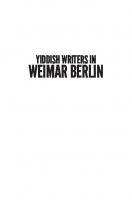Proletarian Performance in Weimar Berlin 1571131264, 9781571131263
New study of the revolutionary theatre of the Weimar republic, examining its interplay with socialist and communist poli
207 96 11MB
English Pages 198 [208] Year 1998
Recommend Papers

- Author / Uploaded
- Richard Bodek
File loading please wait...
Citation preview
he late years of the Weimar Republic were a time of political disillusionment and economic disintegration. Nowhere were the forces competing for the political allegiances of the working class more active than in Berlin. Bodek’s study examines the interplay of socialist and communist politics with the world of the working class (and particularly its young people) in the forms of agitprop theater, workers’ chorus, and the modernist theater of Brecht. Using sources such as newspaper articles and reviews,
the texts of agitprop plays, festival and concert programs, and police reports, Bodek provides a new angle on the cultural and political forces at work in the proletarian sphere during the period, and shows how the theater of Brecht draws on many of its aesthetic assumptions. Bodek examines the very different aesthetics and political assumptions of Social Democratic workers’ choruses and Communist agitprop theater. Although the political cadres of both parties were concerned with the influence of economic, social, and class factors on the pro-
duction of art and in turn on the population in general, they developed and pursued radically different programs in their attempts to use culture to further their political goals. The unwillingness of these two Marxist movements to work together helped to open the door to the National Socialist seizure of power. The book’s attention to Communist agitprop troupes in Berlin is path-breaking. The young people of these troupes wrote and performed their own material, which was supposed to be of general topical interest and based on the Communist Party’s (the KPD’s) political line at
the time. The troupes were important to the KPD because they served as a surrogate mass medium for communication of its message. To understand these troupes, Proletarian Performance in Weimar Berlin investigates the realities of the lives of working-class youth of the period,
describing and analyzing unemployment, hous-
Lavery Library St. John Fisher College Rochester, New York
Digitized by the Internet Archive in 2022 with funding from Kahle/Austin Foundation
httos://archive.org/details/proletarianperfoO000bode
Proletarian Performance in Weimar Berlin
Studies in German Literature, Linguistics, and Culture General editor James Hardin
(South Carolina)
Proletarian Performance in Weimar Berlin
The Agitprop Troupe Red Wedding performs in the courtyard of one ofBerlin’s myriad Mietskasernen.
Richard Bodek
Proletarian Performance In Weimar Berlin: Agitprop, Chorus, and Brecht
CAMDEN
HOUSE
Copyright © 1997 by CAMDEN HOUSE, INC. Published by Camden House, Inc. Drawer 2025 Columbia, SC 29202 USA Printed on acid-free paper. Binding materials are chosen for strength and durability. All nghts reserved, including the nght of reproduction in whole or in part in electronic or any other form. All rights to this publication will be vigorously defended.
Printed in the United States of America
ISBN 1-57113-1264 Library of Congress Cataloging-in-Publication Data Bodek, Richard, 1961-—
Proletarian performance in Weimar Berlin: Agitprop, chorus, and Brecht / Richard Bodek. p. cm. -— (Studies in German literature, linguistics, and culture (Unnumbered)) Includes bibliographical references and index. ISBN 1-57113-126—4 (alk. paper) 1. Agitprop theater—Germany—Berlin. 2. Workers’ theater-Germany—Berlin—History—20th century. 3. Theater—Political aspects—Germany—Berlin—20th century. 4. Brecht, Bertolt, 1898-1956—Cniticism and interpretation. I. Title. II. Series PN3307.G4B64 1997 792' .022—dc21 97-1569] CIP
For Amy, with love.
SS
tT?
-
Vises
ey P Rnetidhad »
J
»:
.e -oR
is
=p
fava en
|
?
ea ee
7
~ mn ele o> j=” (4% 7 Ge o
2 S = i)S ny S ee a
e
sa)
“
¥a!71 3937110 y3 >
Agitprop, Chorus, and Brecht
bi Oeet O
“Richard Bodek’s well-researched book proves convincingly that the revolutionary theater ofthe Weimar Republic was not an avant-garde » fad, but rather a phenomenon brought about by the highly divisive political, social, and economic reality of Weimar Germany. After reading Bodek’s book one better understands the oft-stated assertion that the Weimar Republic was a ‘republic without republicans.”
—Wolfgang D. Elfe, University of South Carolina
Camden House, Inc. DRAWER 2025 CotumBIA, SC 29202 USA ORDERS 1-800-723-9455
ISBN 1-57113-126-4 | |
9°781571
|
131263
9 0000
|






![Murder Scenes : Normality, Deviance, and Criminal Violence in Weimar Berlin [1 ed.]
9780472026975, 9780472117246](https://ebin.pub/img/200x200/murder-scenes-normality-deviance-and-criminal-violence-in-weimar-berlin-1nbsped-9780472026975-9780472117246.jpg)
![Hollywood in Berlin: American Cinema and Weimar Germany [1 frontisp., Reprint 2020 ed.]
9780520914162](https://ebin.pub/img/200x200/hollywood-in-berlin-american-cinema-and-weimar-germany-1-frontisp-reprint-2020nbsped-9780520914162.jpg)

